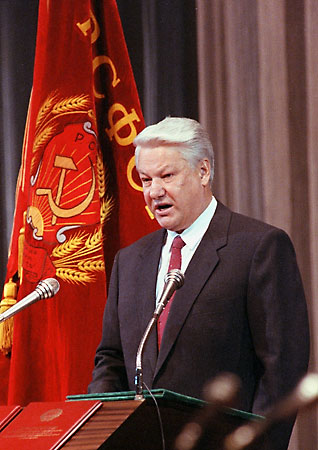Politburo, in Russian and Soviet history, the supreme policy-making body of the Communist Party of the Soviet Union. The Politburo until July 1990 exercised supreme control over the Soviet government; in 1990 the Politburo was enlarged and was separated to a certain degree from control over the Soviet government. With the breakup of the Soviet Union in 1991 and the subsequent banning of the Communist Party in Russia (1991), the Politburo also was effectively dissolved.
The first Politburo was created in Russia by the Bolshevik Party Central Committee in late October 1917 to provide continuous and flexible leadership in that year’s uprising. The seven Politburo members included Vladimir Lenin, Leon Trotsky, and Joseph Stalin. The Bolshevik coup accomplished, the Politburo was dissolved. The 8th Party Congress in March 1919 instructed the Central Committee to elect a new Politburo of five from its ranks; its formal role would be to decide on questions too urgent to await Central Committee deliberation. The Politburo soon assumed a major position in party and state administration, and it eventually came to overshadow the role of the Central Committee. Because the party secretariat planned the agenda, provided all documentation for debate, and transmitted Politburo decisions to the lower echelons, the general secretary of the Communist Party (Stalin) became the Politburo’s most influential member. Following the power struggles after Lenin’s death in 1924, Stalin achieved a controlling position on the Politburo, exercising complete dominance over it and the party in general.
In 1952 the Politburo was abolished and was replaced by a larger Presidium of the Central Committee. More stress was laid on “collective leadership” within this body after the tyrannical excesses of Stalin (d. 1953), and the Presidium was actually strong enough to remove Nikita Khrushchev from the party’s leadership in 1964. The old name of Politburo was revived for the body in 1966.
The Politburo’s membership was nominally elected by the Central Committee of the Communist Party, but in truth the Politburo was a self-perpetuating body that itself decided which new members would be admitted and which members expelled. Until mid-1990 it consisted of about 12–15 members and 5–8 candidate members. With the changes made in 1990, the body grew to include a representative from each of the Soviet republics. Several top government officials were dropped from the Politburo; though they remained party members, they were to concentrate on their responsibilities as members of the presidential council. The chairman of the Politburo was the general secretary of the Communist Party and, traditionally, was in effect the leader of the Soviet Union. (For most of its existence, the Politburo included the minister of defense, the head of the KGB [the Soviet secret police], and the heads of the most important republic or urban party organizations.) The Old Bolshevik ideologues who sat in the early Soviet Politburo by the late 1980s had been replaced by party members with some technical training and records of long and loyal service in the bureaucracy.
The politburos of the eastern European communist countries were similar in form and function to the Soviet model. The politburo of China is also similar, but it contains a Standing Committee of about 7 members who exercise great power within the party and the politburo itself.

















